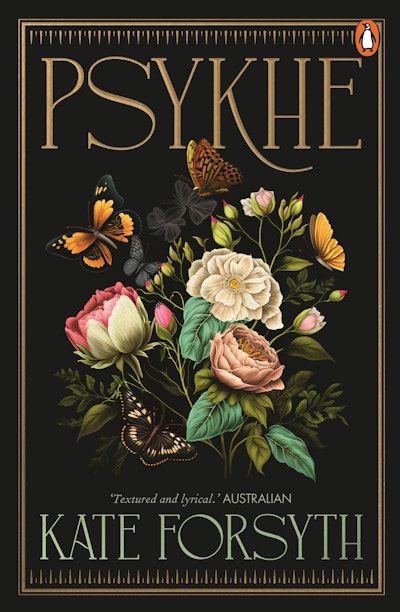A new twist on a Greek myth that gives voice, power and agency to the woman at the centre of the story.
Psykhe is a gripping, magical retelling of the Psykhe and Eros myth by master storyteller, Kate Forsyth. When Psykhe falls in love with a man whose face she is forbidden to see, she must risk everything to try and save him . . . even if it means travelling to the shadowy underworld to face Proserpina, queen of the dead.
Full of complex ideas about love, loyalty and family, Psykhe is a feminist fairytale that will have your book club enthralled from page one.
Discussion points and questions
- Were you aware of the ancient Greek myth of Eros and Psykhe before you read this novel? What is your general familiarity with Greek mythology?
- Part 1 begins with a quote from Apuleius: ‘The youngest daughter was so strangely and wonderfully fair that human speech was all too poor to describe her beauty.’ Discuss the different ways that Kate engages with the idea of ‘fairness’ in her story.
- Kate chose to set her retelling of this ancient myth during the final days of the Roman kingdom. What did this real historical and geopolitical setting add to the book?
- ‘Eros and Psykhe’ is often called the first fairy tale, and is believed to be the taproot of ‘Beauty and the Beast’. What roles do myths and fairy tales play in our contemporary lives?
- Psykhe becomes a healer, a midwife, and a witch. Do these three roles intersect? How does Psykhe grow and change over the course of her story?
- How integral is Nocturna in Psykhe’s transformation?
- Was Psykhe wrong to insist on seeing Ambrose’s face? Why did she do it? Could you see their relationship continuing if she had remained obedient?
- Psykhe’s road to wisdom is hard-won – she struggles with self-doubt and fear, and against the limitations of her own body, most specifically played out in her journey to the Underworld. Do we all face similar struggles?
- The author set out to write a feminist reframing of Psykhe’s story. In what way does she reinterpret this story, which has been told and retold by men over the ages, to make it a story relevant for women today?
- The novel begins with Psykhe’s birth and ends with her death. Did you find the ending tragic, or beautiful and full of hope? Why?
- Did this reimagining of the myth make you want to read or return to the original? If so, how does Kate Forsyth’s version of the tale differ from Lucius Apuleius’s version?













